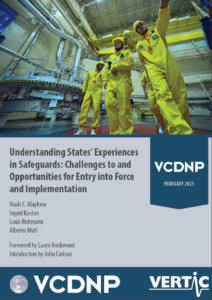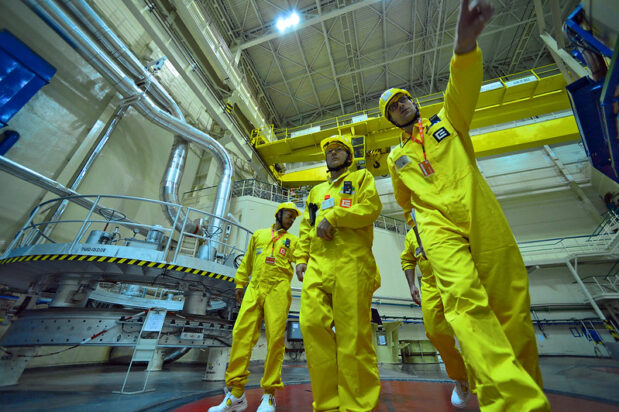
What are the drivers for States to take action on concluding the legal instruments that comprise the safeguards system of the International Atomic Energy Agency (IAEA)? What are the challenges they face for entry into force and implementation and how do they overcome them? How can the impact of outreach and capacity building activities on safeguards be enhanced to further the universalisation of safeguards legal instruments and improve States’ capacity to bring them into force and implement them?
This is the focus of a new report published by the Vienna Center for Disarmament and Non‑Proliferation (VCDNP) with the Verification Research, Training and Information Centre (VERTIC). The report is the result of a VCDNP‑VERTIC project that aimed to provide actionable, Member State‑driven recommendations for the IAEA, States and Groups of States that conduct outreach and capacity building activities on safeguards to increase the impact of such activities. In formulating these recommendations, the VCDNP and VERTIC sought to understand what motivates States to take action (or not take action) on safeguards. Following five months of interviews with representatives of 17 States that had recently taken action on safeguards for their countries, the VCDNP and VERTIC formulated 24 recommendations for increasing the impact of safeguards outreach and capacity building.
These recommendations were separated into five categories:
- Peaceful Uses. The majority of States interviewed stressed that action taken on safeguards had been driven by the desire to expand access to the peaceful uses of nuclear energy, science and technology.
- Non‑Proliferation. As important for the majority of States interviewed was the desire to stress their commitment to the global non‐proliferation regime, including obligations under the Treaty on the Non‑Proliferation of Nuclear Weapons, as well as their safeguards instruments.
- Leveraging. Interviewees referenced the utility of leveraging other mechanisms for action on safeguards, including: (1) utilising pre‑existing national committees established for purposes other than safeguards to take advantage of political momentum; (2) responsibly leveraging expanded access to peaceful uses as a way to motivate action on safeguards; and (3) expanding the role of and support from regional organisations, such as the African Commission on Nuclear Energy (AFCONE).
- Awareness. All of the States interviewed for the project emphasised the importance of awareness raising among all stakeholders within their governments, in particular the effectiveness of a “top‑down, bottom‑up” approach to outreach and capacity building.
- Capacity. Many interviewees emphasised that capacity building in safeguards could itself be a catalyst for States to take action on safeguards; that capacity building is an activity that can promote entry into force and that it should be continuous after entry into force to support sustainable implementation.
These themes comprise a kaleidoscope of factors that should be considered when conducting outreach and capacity building activities. While the Part I of the report includes analysis and recommendations from the VCDNP and VERTIC, Part II of the report is dedicated to telling the stories of the State representatives interviewed to preserve institutional memory. The VCDNP and VERTIC hope that this report will be a reference to those conducting outreach and capacity building activities and improve the impact of such activities already taking place.
The VCDNP extends its thanks to the Foreign Commonwealth and Development Office of the United Kingdom for its generous support that funded this project.

